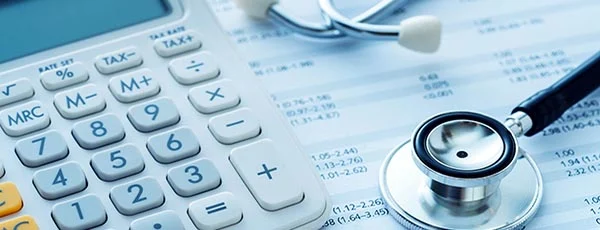
Get rid of your debt faster with debt relief
Choose your debt amount
Or speak to a debt consultant 844-731-0836
- Owning a home has a lot of extra costs besides the mortgage.
- It is a good idea to make a list of all of your bills, both monthly, seasonal, and one-off expenses.
- Learn to budget for all of your costs.
- Start your FREE debt assessment
Table of Contents
Buying a house could be a good move financially if it turns out to be cheaper than renting. Before you buy, however, it's essential to understand the costs of owning a home.
You'll have to pay the mortgage each month, of course. But there are other house bills you'll also be responsible for paying. Making a list of bills to pay can help you decide if homeownership is in your budget.
Home Mortgage Costs
Unless you have the cash to buy a home, a mortgage will likely be the largest of your house bills. A mortgage is a loan secured by the home you plan to buy. A typical mortgage term is 30 years, meaning 360 monthly payments.
What's included in a mortgage payment?
For many homeowners, a mortgage payment includes four things:
- Principal
- Interest
- Property taxes
- Homeowners Insurance
Mortgage lenders refer to this payment as PITI (principal, interest, taxes, insurance). The principal is the amount you borrowed to buy the home, while interest is what the lender charges you to borrow. Mortgage insurance is something you might have to pay if you put down less than 20% on the home.
Many lenders require you to pay your property taxes and insurance with your mortgage payment. The lender holds the money in an impound or escrow account and pays your taxes and insurance premiums as they come due.
Home Insurance Bills
Homeowner's insurance is one of the most important house bills to plan for because it's designed to protect your investment in your house. If your property is damaged, a homeowner's policy can pay for covered perils, such as fire or theft. You may also purchase optional coverage for floods and other hazards. Homeowners insurance also provides liability coverage if someone becomes injured on your property.
The average homeowner's insurance premium is $1,272 annually.
Property Tax Bills
Property taxes are costs you pay to own a home or land. State and local government entities typically issue property tax bills. For example, you might get a property tax bill from your county tax assessor each year.
The amount you pay in property taxes depends on where you live and the property tax rate for that area. States with the highest average property tax bills by tax rate include New Jersey, Illinois and New Hampshire. Meanwhile, Alabama, Louisiana and Wyoming have the lowest property tax rates.
Utility Bills
Utility services are necessary, so it's important to factor those expenses into your list of house bills. What you might pay for utilities can depend on which of these services your home uses:
- Electric power
- Natural gas
- Water
- Sewer
Other home-related services include garbage collection, recycling pickup, internet, and cell service.
Maintenance Bills
One of the most significant costs of owning a home you'll need to plan for is maintenance. Home maintenance expenses can cover a variety of things, including:
- Seasonal HVAC servicing
- Lawncare
- Replacing smoke alarms and carbon monoxide detectors
- Insulating windows and doors
- Cleaning laundry ducts and vents
- Indoor deep cleaning
- Outdoor cleaning, including cleaning the gutters
A commonly used rule of thumb for home maintenance is to budget 1% to 3% of the home's purchase price each year for basic upkeep. So if you buy a $400,000 home, you might need to set aside anywhere from $4,000 to $12,000 a year for maintenance.
That's a decent amount of money, but maintenance is vital for keeping your home in good condition. Failing to keep up with basic maintenance could lead to larger repair bills down the line and make your home harder to sell in the future.
Repair Bills
Owning a home means that inevitably, something will break. And since there's no landlord to fix it, you'll have to handle it yourself.
Some of the most common repair bills you might encounter as a homeowner include:
- Replacing the HVAC system
- Replacing appliances
- Roof repairs
- Water heater replacement
- Septic system repairs
- Plumbing repairs
- Electrical repairs
If you're using the 1% to 3% rule to budget for maintenance in your house bills, you could dip into those funds to cover repair bills. And if you're tempted to DIY repairs, consider what's involved first. One way to avoid the hardship an unexpected repair creates is to purchase a home warranty. They cost a few hundred dollars and limit the cost of repairs to a small co-payment. Make sure you understand what the policy covers and vet your insurer to make sure it's reputable.
Something small, like replacing a leaky faucet, might be an easy fix you can do yourself. But if your entire home needs to be rewired or the roof needs replacing, that's something you're probably better off paying a professional to tackle.
How to Budget for the Costs of Owning a Home
If you're considering buying a home, there's one crucial question to ask first: how much house can I afford?
Planning out a homebuying budget that includes all of the house bills listed here is an excellent place to start. As a general rule of thumb, homebuyers should spend no more than 28% of their income on housing expenses.
That 28% applies to your total mortgage expenses. So that’s the whole PITI. Ideally, your total debt-to-income (DTI) ratio, which indicates how much you spend on debt repayment each month, should be no more than 36% (although mortgage lenders will allow you to go as high as 36% for the housing costs and 43% for total costs if you are well qualified).
Lenders use these numbers to make sure homebuyers don't get in over their heads with mortgage debt. And you can use them to plan your house bills budget to see how much more – or less – you might spend to buy a home vs. renting one.
How to Save Money on House Bills
Some costs of owning a home aren't really negotiable. Property tax bills, for instance, aren't under your control. But there are other house bills you might be able to save on, starting with the mortgage itself.
Your monthly mortgage payment is determined primarily by:
- How much you borrow
- Mortgage interest rates
- Mortgage insurance premiums, if those apply
- Escrow costs
Negotiating a better price on the purchase of a home lets you borrow less money. That isn't always easy to do, especially when it's a seller's market and there are lots of buyers competing for the same homes. Getting pre-approved for a mortgage could give you an edge at the negotiation table, as it shows the seller that you're committing to buying.
You can also borrow less by opting for a cheaper home. Getting a smaller mortgage means you might be able to offer a larger down payment. Doing so could help you save money on mortgage expenses if you can put down enough to avoid private mortgage insurance. You'll need at least 20% down for conventional loans to get out of PMI, but even 10% or 15% will get you cheaper premiums. Your property tax bills and home insurance bills may also be less for a smaller home.
The interest rate you pay for a mortgage depends on your financial situation and credit scores. It's a good idea to check mortgage rates before applying for a home loan to understand what you might pay. The higher your credit scores, the lower the rates you're likely to be offered by lenders. So if you're not ready to shop for a mortgage just yet, you can spend some time working on improving your credit.
Some of the best ways to raise credit scores include:
- Paying bills on time
- Paying down debt balances to lower your credit utilization ratio
- Holding off on applying for new credit
- Keeping your older accounts open
If you're struggling to get a grip on your debt, address that before you start looking for a mortgage. Paying off some of your debts or refinancing to lower their payments can make home buying and house bills more affordable.

Get rid of your debt faster with debt relief
Take the first step towards a debt-free life with personalized debt reduction strategies.
Choose your debt amount
Or speak to a debt consultant 844-731-0836
What are the costs of owning a home?
The main costs of owning a home include the mortgage, property taxes, homeowner's insurance, utility bills, maintenance and repairs. How much you pay to own a home depends on the size of your mortgage, interest rates, property taxes rates, homeowner's insurance rates, utility rates and the home's age.
What are monthly house expenses?
Monthly house expenses are recurring expenses, such as your monthly mortgage payment and utility bills. Your property taxes and homeowner's insurance may be escrowed into your monthly mortgage payment. House expenses you might pay less often include maintenance and repairs.
What house bills are most important to pay?
The most important house bill to pay is your mortgage. If you fail to pay your mortgage on time each month, you risk falling into default. Once you default on a mortgage, your lender can initiate foreclosure proceedings against you. If the home is foreclosed on, the lender assumes ownership and your credit can take a serious hit.
Recommended Reads







